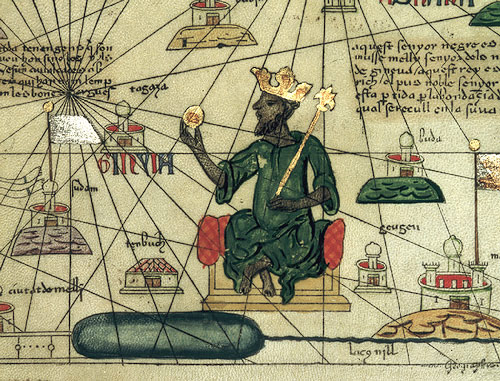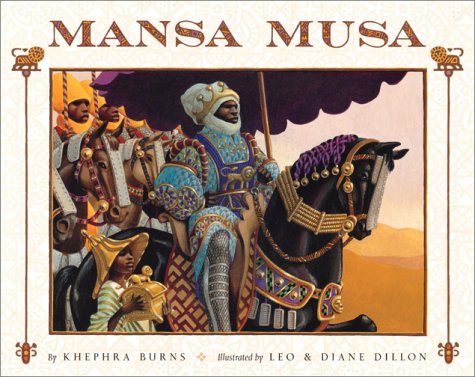
 |
MANSA MUSA The pious African Sultan |
Post Reply 
|
| Author | |||
rami 
Moderator Group 
Male Joined: 01 March 2000 Status: Offline Points: 2549 |
 Post Options Post Options
 Thanks(0) Thanks(0)
 Quote Quote  Reply Reply
 Topic: MANSA MUSA The pious African Sultan Topic: MANSA MUSA The pious African SultanPosted: 19 November 2005 at 3:32am |
||
|
Bi ismillahir rahmanir raheem
asslamu alaikum Mansa Moussa: Pilgrimage of Gold In 1312 Mansa Moussa, the most legendary of the Malian kings, came to the throne. Mansa Moussa was a devout Muslim who built magnificent mosques throughout his empire in order to spread the influences of Islam. During his reign, Timbuktu became one of the major cultural centers of not only Africa but of the entire Islamic world. When Mansa Moussa came to power, the Mali Empire already had firm control of the trade routes to the southern lands of gold and the northern lands of salt. Under Moussa's reign, the gold-salt trade across the Sahara came to focus ever more closely on Timbuktu. The city's wealth, like that of many towns involved in the trans-Saharan trade route, was based largely on the trade of gold, salt, ivory, kola nuts, and slaves. Mansa Moussa expanded Mali's influence across Africa by bringing more lands under the empire's control, including the city of Timbuktu, and by enclosing a large portion of the western Sudan within a single system of trade and law. This was a huge political feat that made Moussa one of the greatest statesmen in the history of Africa. Under Moussa's patronage, the city of Timbuktu grew in wealth and prestige, and became a meeting place of the finest poets, scholars, and artists of Africa and the Middle East. Mansa Moussa brought the Mali Empire to the attention of the rest of the Muslim world with his famous pilgrimage to Mecca in 1324. He arrived in Cairo at the head of a huge caravan, which included 60,000 people and 80 camels carrying more than two tons of gold to be distributed among the poor. Of the 12,000 servants who accompanied the caravan, 500 carried staffs of pure gold. Moussa spent lavishly in Egypt, giving away so many gold gifts�and making gold so plentiful�that its value fell in Cairo and did not recover for a number of years! In Cairo, the Sultan of Egypt received Moussa with great respect, as a fellow Muslim. The splendor of his caravan caused a sensation and brought Mansa Moussa and the Mali Empire fame throughout the Arab world. Mali had become so famous by the fourteenth century that it began to draw the attention of European mapmakers. In one map, produced in 1375, Moussa is shown seated on a throne in the center of West Africa, holding a nugget of gold in his right hand. After visiting the holy cities of Mecca and Medina on his pilgrimage, Moussa set out to build great mosques, vast libraries, and madrasas (Islamic universities) throughout his kingdom. Many Arab scholars, including the poet and architect, Abu-Ishaq Ibrahim-es-Saheli, who helped turn Timbuktu into a famous city of Islamic scholarship, returned with him. Moussa had always encouraged the development of learning and the expansion of Islam. In the early years of his reign, Moussa had sent Sudanese scholars to study at Moroccan universities. By the end of his reign, Sudanese scholars were setting up their own centers of learning in Timbuktu. He commissioned Abu-Ishaq Ibrahim-es-Saheli to construct his royal palace and a great mosque, the Djingareyber Mosque, at Timbuktu. Still standing today, the Djingareyber Mosque consists of nine rows of square pillars and provides prayer space for 2,000 people. Es-Saheli introduced the use of burnt brick and mud as a building material to this region. The Djingareyber's mud construction established a 660-year-old tradition that still persists: each year before the torrential rains fall in the summer, Timbuktu's residents replaster the mosque's high walls and flat roof with mud. The Djingareyber Mosque immediately became the central mosque of the city, and it dominates Timbuktu to this day. During Moussa's reign Timbuktu thrived as a commercial center and flourished into a hub of Islamic learning. Even after the Mali Empire lost control over the region in the fifteenth century, Timbuktu remained the major Islamic center of sub-Saharan Africa. Another article about him with different information not mentioned above. MANSA MUSA Mansa Musa was an important Malian king from 1312 to 1337 expanding the Mali influence over the Niger city-states of Timbuktu, Gao, and Djenne. Mansa Musa (Mansa meaning emperor or sultan and Musa meaning Moses), the grandson of one of Sundiata�s sisters, is often referred to as "The Black Moses" (Jeffries & Moss 1997). Timbuktu became one of the major cultural centers not just of Africa but of the world. Vast libraries, madrasas (Islamic universities) and magnificent mosques were built. Timbuktu became a meeting place of poets, scholars and artists of Africa and the Middle East. Even after Mali declined, Timbuktu remained the major Islamic center of sub-Saharan Africa (Hooker 1996). Mansa Musa maintained a huge army that kept peace and policed the trade routes. His armies pushed the borders of Mali from the Atlantic coast in the west beyond the cities of Timbuktu and Gao in the east -- and from the salt mines of Taghaza in the north to the gold mines of Wangar in the south (Jeffries & Moss 1997). By the fourteenth century, Muslim traders were established in the town of Djenne, located in the inland delta of the Niger. The most impressive monument of intercultural borrowing is the Friday Mosque at Djenne. There, salt from the Sahara, goods from northern Africa and fine silks were exchanged for gold, slaves and ivory. The monumental mosque was constructed around 1320 (the present building was reconstructed on the foundation of the original mosque in 1907). The rectangular, flat roofed building had walls supported by plaster-like buttresses topped by finials. The massive rectangular towers reflect the Islamic model while the building materials echo an older Mande architectural style. The toron (horns) projections from the walls are a feature of local architecture serving as scaffolding when the facade is periodically replastered with clay. The African societies shaped and molded the religion with traditional beliefs, values and sensibilities, as well (Peter Mark, Africa, 1996, p. 26). The Islamization of the Malian Court, in the late thirteenth century, is recorded both in oral traditions of the Mande people and written accounts by Arab historians and travelers. Ibn Khaldun described the Hajj (pilgrimage to Mecca) of Mansa Musa in 1324. On his return from the holy city, Mansa was accompanied be an Andulisian poet and architect, al-Tuwayjin who constructed a royal palace (Mark, Africa, p.16). In 1352, the geographer Ibn Battuta spent a month at the court of the Mansa. He described a society where Islamic practice was integrated with local religious rituals and gave accounts of fine figurative sculpture. Many of these terra-cotta figures marked with Islamic symbols have been found recently near Djenne--and for the most part, have been excavated illegally (Decker 1990, p.114). During Battuta's visit to Nyani (in modern Bambara territory) he was witness to masked dancers: "On feast days...the poets come in. Each of them is inside a figure resembling a thrush, made of feathers, and provided with a wooden head with a red beak, to look like a thrush�s head. They stand in front of the Sultan in this ridiculous make-up and recite their poems. Their poems exhort the King to recall the good deeds of his predecessors, and imitate them so that the memory of his good deeds will outlive him. I was told that this practice is a very old custom amongst them, prior to the introduction of Islam, and that they have kept it up." (Willet 1971, p. 93) |
|||
|
Rasul Allah (sallah llahu alaihi wa sallam) said: "Whoever knows himself, knows his Lord" and whoever knows his Lord has been given His gnosis and nearness.
|
|||
 |
|||
rami 
Moderator Group 
Male Joined: 01 March 2000 Status: Offline Points: 2549 |
 Post Options Post Options
 Thanks(0) Thanks(0)
 Quote Quote  Reply Reply
 Posted: 19 November 2005 at 3:40am Posted: 19 November 2005 at 3:40am |
||
|
Bi ismillahir rahmanir raheem
assalamu alaikum some other information and nice images MALI DISCOVERS AMERICA? He said, 'Yes, Oh Sultan, we travelled for a long time until there appeared in the open sea a river with a powerful current�the other ships went on ahead, but when they reached that place, they did not return and no more was seen of them�As for me, I went about at once and did not enter the river.' The Sultan got ready 2,000 ships, 1,000 for himself and the men whom he took with him, and 1,000 for water and provisions. He left me to deputise for him and embarked on the Atlantic Ocean with his men. That was the last we saw of him and all those who were with him. And so, I became king in my own right." Mansa Musa, talking  to Syrian scholar Al-Umari.
to Syrian scholar Al-Umari. 
|
|||
|
Rasul Allah (sallah llahu alaihi wa sallam) said: "Whoever knows himself, knows his Lord" and whoever knows his Lord has been given His gnosis and nearness.
|
|||
 |
|||
rami 
Moderator Group 
Male Joined: 01 March 2000 Status: Offline Points: 2549 |
 Post Options Post Options
 Thanks(0) Thanks(0)
 Quote Quote  Reply Reply
 Posted: 27 December 2005 at 11:53pm Posted: 27 December 2005 at 11:53pm |
||
|
Bi ismillahir rahmanir raheem
assalamu alaikum If any person has played any of Sid Meier's civilisation games, Civ4 has chosen two muslim rullers to represent the muslim Ummah in the game, Salah al Din Ayubi and Mansa Musa. |
|||
|
Rasul Allah (sallah llahu alaihi wa sallam) said: "Whoever knows himself, knows his Lord" and whoever knows his Lord has been given His gnosis and nearness.
|
|||
 |
|||
Post Reply 
|
|
|
Tweet
|
| Forum Jump | Forum Permissions  You cannot post new topics in this forum You cannot reply to topics in this forum You cannot delete your posts in this forum You cannot edit your posts in this forum You cannot create polls in this forum You cannot vote in polls in this forum |